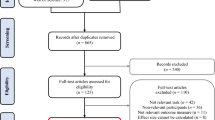Abstract
Recent research on self-focused attention has indicated effects that parallel several cognitive and affective phenomena associated with depression. Specifically, discrepancies between perceived real and ideal self, increased affective response, self-attribution for negative events, and accurate self-reports occur both in depression and as a result of self-focused attention. A study is reported that investigated the relationship between depression and a measure of private self-consciousness, a dispositional measure of the tendency to attend to one's inner thoughts and feelings. As predicted, a reliable positive relationship was found. The potential role of self-focused attention in maintaining and exacerbating depression was discussed.
Similar content being viewed by others
References
Abramson, L., Seligman, M., & Teasdale, J. Learned helplessness in humans: Critique and reformulation.Journal of Abnormal Psychology 1978,87 47–74.
Alloy, L., & Abramson, L. Judgment of contingency in depressed and nondepressed students: Sadder but wiser?Journal of Experimental Psychology, General 1979,108 441–485.
Beck, A. T.Depression: Clinical, experimental and theoretical aspects. New York: Hoeber, 1967.
Beck, A. T., Rush, A. J., Shaw, B. F., & Emery, G.Cognitive therapy of depression. New York: Guilford Press, 1979.
Blaney, P., Behar, V., & Head, R. Two measures of depressive cognitions: Their association with depression and with each other.Journal of Abnormal Psychology 1980,89 678–682.
Brockner, J. Self-esteem, self-consciousness, and task performance: Replications, extensions, and possible explanations.Journal of Personality and Social Psychology 1979,37 447–461. (a)
Brockner, J. The effects of self-esteem, success-failure, and self-consciousness on task performance.Journal of Personality and Social Psychology 1979,37 1732–1741. (b)
Brockner, J., & Hulton, A. J. B. How to reverse the vicious cycle of low self-esteem: The importance of attentional focus.Journal of Experimental Social Psychology 1978,14 564–578.
Bumberry, W., Oliver, J., & McClure, J. Validation of the Beck Depression Inventory in a university population using psychiatric estimate as the criterion.Journal of Consulting and Clinical Psychology 1978,46 150–155.
Buss, A.Self-consciousness and social anxiety. San Francisco: W. H. Freeman, 1980.
Buss, D., & Scheier, M. Self-consciousness, self-awareness and self-attribution.Journal of Research in Personality 1976,10 463–468.
Carver, C., & Glass, D. The self-consciousness scale: A discriminant validity study.Journal of Personality Assessment 1976,40 169–172.
Dempsey, P. An unidimentional depression scale for the MMPI.Journal of Consulting Psychology 1964,28 364–370.
DePue, R., & Monroe, S. Learned helplessness in the perspective of the depressive disorders: Conceptual and definitional issues.Journal of Abnormal Psychology 1978,87 3–20.
Duval, S., & Wicklund, R.A theory of objective self-awareness. New York: Academic Press, 1972.
Duval, S., & Wicklund, R. Effects of objective self-awareness on attribution of causality.Journal of Experimental Social Psychology 1973,9 17–31.
Federoff, N., & Harvey, J. Focus of attention, self-esteem, and the attribution of causality.Journal of Research in Personality 1976,10 336–345.
Fenigstein, A., Scheier, M., & Buss, A. Public and private self-consciousness: Assessment and theory.Journal of Consulting and Clinical Psychology 1975,43 522–527.
Gibbons, F., Smith, T., Brehm, S., & Schroeder, D.Self-awareness and self-confrontation: The role of focus of attention in the process of psychotherapy. Unpublished manuscript, University of Kansas, 1980.
Gong-Guy, E., & Hammen, C. Causal perceptions of stressful events in depressed and nondepressed outpatients.Journal of Abnormal Psychology 1980,89 662–669.
Hammen, C. Depression in college students: Beyond the Beck Depression Inventory.Journal of Consulting and Clinical Psychology 1980,48 126–128.
Ickes, J., Wicklund, A., & Ferris, C. Objective self-awareness and self-esteem.Journal of Experimental Social Psychology 1973,9 202–219.
Kanfer, F. J., & Hagerman, S. The role of self-regulation. In L. P. Rehm (Ed.),Behavior therapy for depression: Present status and future directions New York: Academic Press, 1981.
Krantz, S., & Hammen, C. Assessment of cognitive bias in depression.Journal of Abnormal Psychology 1979,88 611–619.
Kuiper, N. Depression and causal attributions for success and failure.Journal of Personality and Social Psychology 1978,36 236–246.
LaPointe, K., & Crandell, C. Relationship of irrational beliefs to self-reported depression.Cognitive Therapy and Research 1980,4 247–250.
Laxer, R. Self-concept changes of depressive patients in general hospital treatment.Journal of Consulting Psychology 1964,28 214–219.
Lewsinson, P., Mischel, W., Chaplin, W., & Barton, R. Social competence and depression: The role of illusory self-perceptions.Journal of Abnormal Psychology 1980,89 203–212.
Miller, I. W., & Norman, W. H. Learned helplessness in humans: A review and attribution theory model.Psychological Bulletin 1979,86 93–118.
Nadich, M., Gargan, M., & Michael, L. Denial, anxiety, locus of control, and the discrepancy between aspirations and achievements as components of depression.Journal of Abnormal Psychology 1975,84 1–9.
Nelson, R. E. Irrational beliefs and depression.Journal of Consulting and Clinical Psychology 1977,45 1190–1191.
Nelson, R. E., & Craighead, W. E. Selective recall of positive and negative feedback, self-control behaviors, and depression.Journal of Abnormal Psychology 1977,86 379–388.
Overall, J., & Zisook, S. Diagnosis and the phenomenology of depressive disorders.Journal of Consulting and Clinical Psychology 1980,48 626–634.
Pryor, J., Gibbons, F., Wicklund, R., Fazio, R., & Hood, R. Self-focused attention and self-report validity.Journal of Personality 1977,45 513–527.
Rehm, L. P. A Self-control model of depression.Behavior Therapy 1977,8 787–804.
Rizley, R. Depression and distortion in the attribution of causality.Journal of Abnormal Psychology 1978,87 32–48.
Sacco, W., & Hokanson, J. Expectations of success and anagram performance of depressives in a public and private setting.Journal of Abnormal Psychology 1978,87 122–130.
Scheier, M. Self-awareness, self-consciousness, and angry aggression.Journal of Personality 1976,44 627–644.
Scheier, M., Buss, A., & Buss, D. Self-consciousness, self-report of aggressiveness, and aggression.Journal of Research in Personality 1978,12 133–140.
Scheier, M. F., & Carver, C. Self-focused attention and the experience of emotion: Attraction, repulsion, elation, and depression.Journal of Personality and Social Psychology 1977,35 625–636.
Seligman, M., Abramson, L., Semmel, A., & Von Baeyer, C. Depressive attribution style.Journal of Abnormal Psychology 1979,88 242–248.
Turner, R., Scheier, M., Carver, C., & Ickes, W. Correlates of self-consciousness.Journal of Personality Assessment 1978,42 285–289.
Velten, E. A laboratory task for induction of mood states.Behavior Research and Therapy 1968,6 473–482.
Wicklund, R. Objective self-awareness. In L. Berkowitz (Ed.),Advances in experimental social psychology (Vol. 8). New York: Academic Press, 1975.
Author information
Authors and Affiliations
Additional information
The order of authorship was determined randomly.
Rights and permissions
About this article
Cite this article
Smith, T.W., Greenberg, J. Depression and self-focused attention. Motiv Emot 5, 323–331 (1981). https://doi.org/10.1007/BF00992551
Issue Date:
DOI: https://doi.org/10.1007/BF00992551




